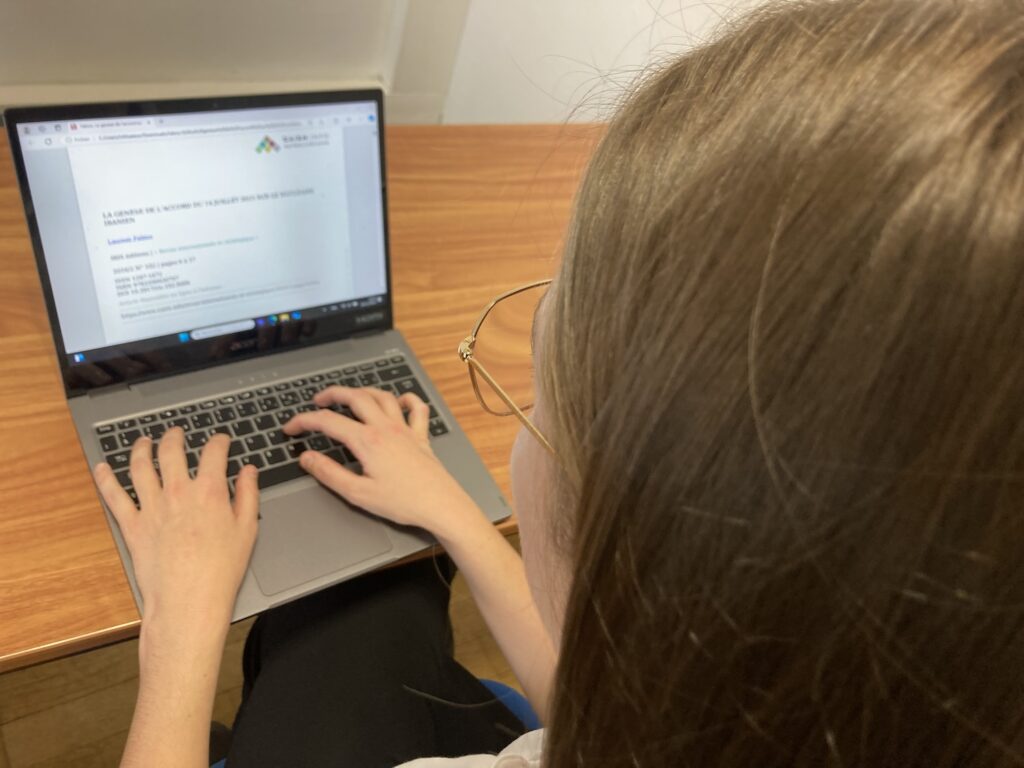At 23, Pauline Mortel has a rich and eclectic academic background. Passionate about strategic issues and geopolitics, she plans to take the CIENS minor, whose interdisciplinary nature and teaching combining the practical experience of practitioners with an academic perspective appealed to her from the outset.
From an early age, Pauline was fascinated by history, geopolitics and security issues. During her teenage years in Bordeaux, she was fascinated by the Cold War period and her reading – Le Monde diplomatique, Courrier International – encouraged her to keep a close eye on world news.
During her double degree in international relations and political science at the IEP in Bordeaux and in history at the Université Bordeaux Montaigne, Pauline went to study at the University of Warwick in the UK as part of an Erasmus exchange, where she had the opportunity to follow a course on the role of intelligence services in Western democracies. This exchange, with its emphasis on international security issues, heightened her interest in the various dimensions of international conflicts.
For the ENS student competition, her research project focused on the influence of geopolitical representations on the rearmament of Sweden, in particular on the strategic island of Gotland, and on the country’s membership of NATO in the face of the Russian threat. She joined the School’s Geography and Territories department in 2021, where she attended the CIENS courses, taught by both practitioners and academics, which corresponded in every way to her interests.
During her first year at CIENS, she was offered a six-month internship at the Permanent Representation of France to the United Nations in New York, which coincided with the Russian invasion of Ukraine. This gave her the opportunity to closely follow developments in the humanitarian situation and the human rights violations committed by the Russian army. She also discovered the extent to which cyber can become a lever of power in terms of disinformation and the destabilisation of entire societies.
Inspiring female figures
The CIENS courses are the ideal extension to her experience. She particularly enjoys Mélanie Rosselet’s course entitled ‘Why Deterrence? One session sticks in her mind during which David Bertolotti, a member of the French delegation that negotiated the 2015 Vienna Agreement on the Iranian nuclear issue, describes the behind-the-scenes of the negotiations. ‘Very precise details about the human factors influencing the discussions and the final content of the Agreement made a strong impression on me. I really felt like I was stepping into the concrete realities of diplomacy’, she says.
In the second half of 2024-2025, she plans to take the course on the state of digital warfare, taught by Maïlys Mangin, a former post-doctoral researcher at CIENS who has just been appointed lecturer in Political Science at the University of Toulouse. For her tutorial project, Pauline plans to extend this course by examining Russia’s use of disinformation as a tool of influence, particularly in the context of its involvement in Africa. ‘I’m fascinated by the way in which the cyber tool can be used not just for the purposes of war itself, but also to influence people in order to interfere in the internal affairs of another country and manipulate public opinion there’.
Aware that this field is still largely dominated by men, she finds the careers of these women teachers, who combine research, diplomacy and security, very inspiring, and this is fuelling her own reflections on her professional future. She is still hesitating between a career dedicated to research and an international career focused on diplomacy and strategy. ‘One thing’s for sure, the CIENS minor will be very useful to me, whatever my future career,’ she concludes.

